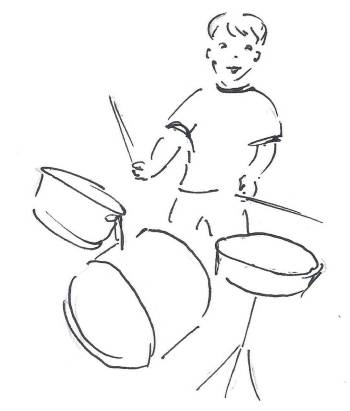Who Makes Culture? The arts begin at home
Each of us, until death or the singularity, occupies exactly one body that is incapable of being in more than one place at a time and is further limited by only being able to be in one time at a time. Worse yet, we only have, as the old soap opera said, one life to live. All of this severely limits the scope of our experience, and if there’s one thing we humans resent, it’s limitation.
Fortunately we were given, as a sort of marvelous consolation prize, imagination. We want more than we can have, so we invented art. It is the drill bit we use to pierce the surface of existence and draw upon the richness of what lies below. It’s the seismic tool that allows us to hear the tremors of a world beyond our own. More than any mode of transportation, it gets us to the places we need to go. And more than any marketplace, it gives the soul what it needs to survive.
I do not simply mean the culture, high or low, that we consume. More important is the culture we create, conjuring it with our own minds and hands. Culture is the way we see and speak; it is the collaborative music of thought born in conversational concert with friends and rivals. Our culture does not start with a theater ticket. It is your invention — and yours, and yours.
But we’ve so ruthlessly professionalized the notion of culture that we often imagine it to be a thing that can be provided only by the elect, a strange noble peerage of those who have “made it.” The elect have detached themselves from the need for immediacy; they provide culture from afar upon the wings of media. You need not — must not — sing a song of your own invention at the party because the elect can sing better than you from across the ether. 
Anyone who has ever forgotten themselves mid-shower and released a sudden song into the studio of tile and glass knows that the best culture is the one you grow at home. Without it, there would be no larger culture — no art, no writing, no newly coined catchphrases, no never-before-heard melodies, no new ideas that express our experience and history and longing and pain and ecstasy. There would only be the recycling and reconfiguring of the pre-existing output of the elect, whose own numbers would begin to dwindle — for they too are born from the song in the shower and the doodle on scrap paper and the bravely struck keys that sprinkle unanointed pixels on a screen.
A reasonable argument could be made that the self-publishing boom, the ever-expanding ecosystem of podcasts, and the Instagram-TikTok-Industrial Complex have solved the problem of hyper-professionalized culture and thrown open the gates of participatory creativity. But the motive behind so much digital culture is precisely the desire to join the elect, or at least to achieve the modern life-justifying state of Being Known, which must at all costs be succeeded by the even higher state of Being Known More. The hydra of the internet can intimidate makers as easily as it can inspire them.
From childhood, we begin to presume that our value lies in our potential to be known. We look for signs of predestination in ourselves and others. Our idea of youth itself descends into a nausea of desperate training, promotion and talent scouting so that we can divine who might be the elect. We squeeze ourselves into this misshapen structure of life when we’re young. Then we grow up and impose it on our children. 
Don’t get me wrong: Excellence is beautiful and striving for it is admirable. But our desperate need to be known and celebrated for our excellence is a path to psychosis. When we decide that our essence, our creative spark, can only be “real” if reified by the outside world, we renounce our agency and condemn ourselves to a lifetime of waiting: When will I matter? When will the world give me permission to sing? When will I be able to lay claim to being the person I am?
The answer is not “fame for all” or “trophies for everyone.” None of us has the right to be known, and fame is a peculiar beast that has to do as much with luck and timing as with excellence. On every street and in every classroom in America you’ll find excellence that will never find fame’s crown. There’s no shame in being a complete unknown. The only shame is to allow it to silence you and render you unknown even to yourself. Your song, your words, your line, your bedtime story, the beat you hear in your head, the soothing words you say to your child, the hard truths you tell to yourself, and the exuberance of your shower melody — that is culture. And it cannot exist without you. ◆












